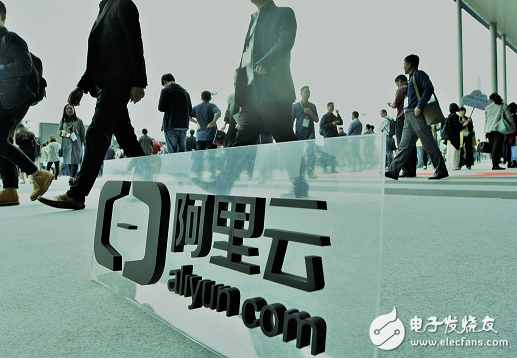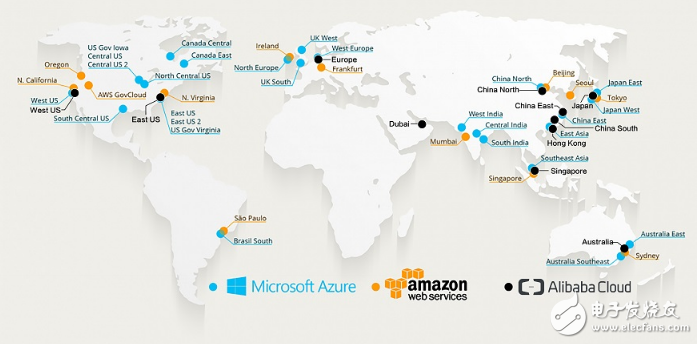Technical strength and e-commerce experience are the foundation of Alibaba Cloud's going abroad, but technology and services, culture and language and policy regulations still need to solve three major challenges.   
In 2016, the cloud computing industry has not yet closed, and Alibaba Cloud has begun to lay out the market in 2017. On November 21, Alibaba Cloud announced in Dubai that its data centers in Europe, the Middle East, Japan and Australia will be opened in the month.
Expanding overseas markets has always been the wish of Chinese entrepreneurs, and for the public cloud itself, which is a global business, internationalization is also a task that must be completed. Alibaba Cloud's opening of data centers in key overseas markets marks the coverage of cloud computing providers in China's major markets, and China Cloud has begun to fully participate in global technology competitions.

For technology companies from China, the biggest challenge of globalization is mainly from the strength of science and technology. For public cloud vendors, especially their own technical strength is the basis and guarantee for the success of globalization.
On November 16th, at the 3rd World Internet Conference, Alibaba and Ant Financial Co., Ltd. jointly developed a large-scale distributed high-availability e-commerce transaction processing platform based on the “Flying†open platform. Results. Apsara is a global ultra-large-scale general-purpose computing operating system independently developed by Alibaba Cloud. It is also Alibaba Cloud's core software system, which can connect millions of servers all over the world into one super virtual computer.
On the day of the 2016 Tmall Double 11 Global Carnival, the “Flying†system achieved a peak of 175,000 transactions per second and a peak of 120,000 payments per second. In 2009, the peak data of the first double 11 was only It is 400 transactions per second. In the past eight years, Feitian System successfully supported the surge of 437 times of e-commerce transactions, and also supported the rapid growth of Alibaba Cloud: in the second quarter of Alibaba Group's fiscal year 2017 financial report, as of September 30, 2016, Alibaba Cloud paying users The number increased by 108% year-on-year to 651,000, and the revenue increased by 130% year-on-year to 1.493 billion yuan, a record high.
Alibaba Cloud has once again achieved its results in the 2016 World Big Data International Competition Sort Benchmark. On November 10th, Sort Benchmark officially announced that Alibaba Cloud won the world championships of CloudSort's Indy (special purpose sorting) and Daytona (general purpose sorting) with $1.44/TB, breaking the AWS created and maintained in 2014. Recorded at 4.51$/TB. In 2015, Alibaba Cloud participated in the SortS Benchmark competition to evaluate the scale and efficiency of the computing system, GraySort and MinuteSort, and broke four world records.
It is worth mentioning that CloudSort is also called "cloud computing efficiency dispute", the competition is to complete the 100T data sorting cost, is also the most realistic project in the Sort Benchmark competition. In this year's competition, Alibaba Cloud ECS, which was sold by Alibaba Cloud's official website, was used by a joint team of Nanjing University, Alibaba Cloud and Databricks, and used daily configuration to form a cluster at an open price.
CloudSort's results show that Alibaba Cloud has completed the three technical strengths of scale, efficiency and cost, and has the ability to turn world-class computing power into Pratt & Whitney Cloud Technology. The subsequent globalization expansion is a natural result.

AWS, Microsoft Azure and Alibaba Cloud global data center distribution comparison, Alibaba Cloud provides
Alibaba Cloud has previously established data centers in the western United States, the eastern United States, Singapore and Hong Kong, and has established overseas business headquarters in Singapore. As the data centers in Europe, the Middle East, Japan and Australia begin to provide services, Alibaba Cloud's computing nodes will include 3 North China, 2 East China, South China, Hong Kong, Singapore, Eastern United States, Western United States, Japan, Europe, Middle East and Australia. Wait for 14 to provide storage, security, middleware, big data, artificial intelligence and other cloud products for users at home and abroad.
Currently, the global cloud computing market is growing at a high rate. According to IDC data, the global cloud computing market revenue will reach $141 billion by 2019, double the size of the $70 billion market in 2016. Gartner also has similar forecasts. In 2015, the typical cloud service market represented by IaaS, PaaS and SaaS reached 52.24 billion US dollars. It is expected to reach 143.53 billion US dollars in 2020, with a compound annual growth rate of 22%.
In the face of this huge global cloud computing market and the general trend of Chinese companies expanding overseas, Alibaba Cloud began to develop international markets in 2015. DJI Innovation, Philips, Schneider, and Dana Technologies are using Alibaba Cloud's overseas. cloud service. In April 2016, Alibaba Cloud entered into a cooperation with SK Group, the third largest multinational company in South Korea, to enter the Korean cloud computing market. In May 2016, Ali and Softbank announced that they will cooperate to expand the Japanese cloud computing market.
Sky Curtain,Led Grille Screen,High Resolution Display Screen,Led Grille Screen
Kindwin Technology (H.K.) Limited , https://www.ktl-led.com
